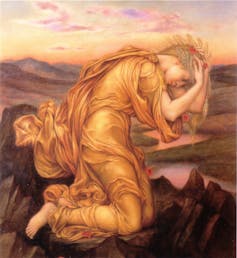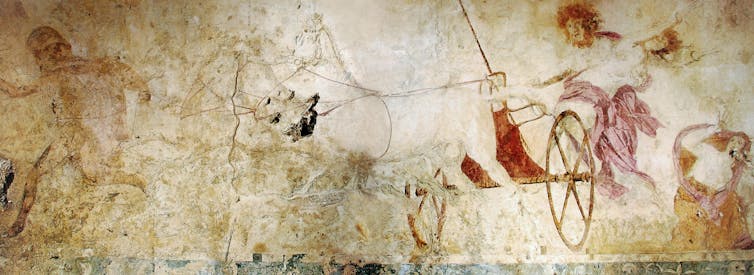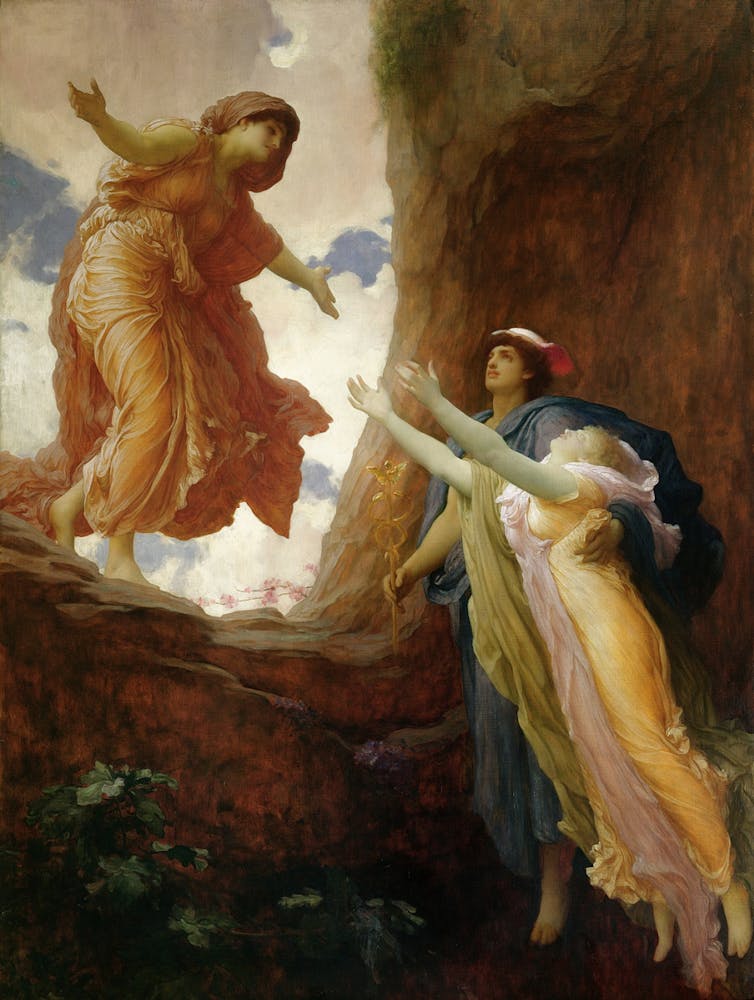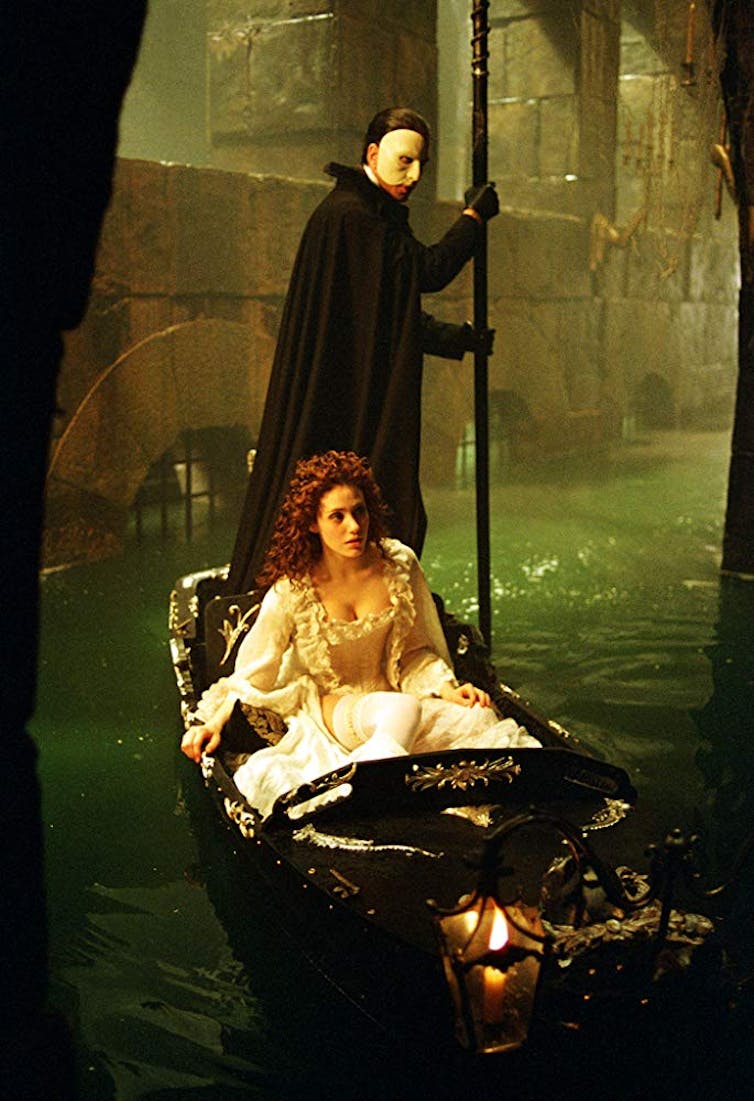what sad message does rhea bring to demeter
The educatee of Greek mythology is oft struck past the fact that some gods and goddesses take extensive roles in the mythical narratives, and others have very limited parts to play. The goddess Demeter is an interesting case of this. As an Olympian goddess and fertility figure, she is very important in aboriginal Greek religion and life, but she has a rather small role in its literature and mythology.
She is mentioned a little bit in Homeric ballsy, particularly the Iliad, just has no actual function to play either in the Iliad or the Odyssey. Nor does she feature at all as a character in extant Greek drama.
Baca juga: Guide to the classics: Homer's Iliad
At that place is, however, a rather beautiful poem called the "Homeric Hymn to Demeter" in which Demeter and her daughter Persephone are the primal focus of attention. It probably dates to the start half of the 6th century BC. Information technology is 495 lines long and composed in hexameters, the same poetic metre every bit the Iliad and Odyssey. Despite its connections to epic poesy, withal, and the title "Homeric", the hymn is of uncertain authorship.
A mother's love
The focus of the verse form is one of the most renowned narratives from Greek mythology - the rape of Persephone by Hades, the god of the Underworld, and the response of Demeter to her loss. Information technology is a remarkable narrative, built fundamentally on the power of a female parent's love for her only child.

The aboriginal Greek word for "female parent" [meter] is actually embedded in Demeter's proper name. The Hymn describes the primordial maternal power brought to bear upon the male person sky-god Zeus, who had secretly (ie without Demeter'due south knowledge) given over his daughter Persephone to a marriage with his brother Hades.
Demeter is one of the "older" generation of Olympian gods. Her siblings are Zeus, Poseidon and Hades on the male person side, and Hera and Hestia on the female side. Zeus, the sky god, has sexual relations with two of his sisters - Hera, who is a kind of long-suffering queen of heaven; and Demeter, who is more earth-focused. In a famous passage in Iliad 14, Zeus recounts to Hera herself some of his sexual exploits, and he names Demeter in his long list of amours.
Persephone is not mentioned in the passage as the production of this item sexual come across, but that is definitely the idea. Demeter and Persephone are ofttimes thought of together equally "The Two Goddesses". This proper noun helps to emphasise the power of their bond, and the gravity of Zeus'south activeness in violently separating them.
The Hymn tells the story of Persephone and other young girls gathering flowers in a meadow. As she bends downwardly to choice a beautiful flower, the earth opens up and Hades emerges on his horse-fatigued chariot. She gives out a scream, but he carries her off into the depths of the earth.

A blight on the land
Her mother hears her weep, and begins a search for her throughout the whole globe. Whilst ever Persephone is missing Demeter creates a blight on the state in which nothing germinates and nothing grows. She would have destroyed humanity altogether if Zeus hadn't taken notice, and acted accordingly.
A human genocide is clearly not in the gods' interest. Information technology would deprive them of the honours that they receive from mortals. Their existence without honours from humans would be intolerable, and Zeus, equally ruler of the world, can't allow information technology to happen. But Demeter will not let become of her fury at the loss of her daughter. She won't go to Olympus, the home of the gods, and she won't let the fruit grow on earth until she sees Persephone again.
Zeus is forced to relent and sends the messenger Hermes to the Underworld to go the daughter back. Simply, just as she is going, Hades prevails on her to eat the seed of a pomegranate to foreclose her from staying with her mother higher up the earth all her days. Persephone is therefore forced to spend one-3rd of each year under the earth with Hades, and two-thirds with her mother and the community of gods on Mountain Olympus.
Persephone's transition from the feminised world of a flowery meadow to the unrelenting male person world of Hades could scarcely be more key.
The male gods who perpetrate the deed, Zeus and Hades, have no redeeming features whatever in the Hymn, and they are really undone past the sheer forcefulness of Demeter's dearest for her daughter. The main narrative of the Hymn has some similarities to Achilles' response to the loss of Patroclus in the Iliad, only Demeter'southward wrath is universal with a kind of catholic maternal power to information technology.
A new bike of life and death
Persephone'south eating of the pomegranate seed means that a compromise is fix up, in which the earth changes forever. Whereas she might have expected an immortal existence with her female parent on Olympus, Persephone becomes the cardinal figure in a new cycle of life and decease.
She is both queen of the Underworld, equally wife of Hades, and associated with the new life that rises with the spring. Expiry and life are no longer mutually sectional, just co-be in both the upper and lower worlds. There is life in death, and decease in life.

The Demeter Hymn contains the foundation myth of the Eleusinian Mysteries - renowned religious rites which took place at Eleusis, almost to Athens. Initiation into the Mysteries held out the prospect of making decease less threatening.
The establishment of Persephone as a feminine presence in the Underworld, as described in the Hymn, corresponds to the notion that death is not equally terrifying every bit it could accept been had Hades alone been present as ruler in the world of the expressionless.
Like many Greek myths the story of Persephone's descent into the realm of Hades, and her emergence from it, has resonances in gimmicky arts, nigh especially the notion of death and rebirth.
One parallel worth noting is the Phantom of the Opera in the version by Andrew Lloyd-Webber (et al.) in which Erik leads Christine down into the cellars of the opera house on to a boat and across a subterranean lake.

Erik and so sings to Christine of the attractions of his isolated earth of darkness and dark:
Slowly, gently night unfurls its splendor
Grasp information technology, sense it, tremulous and tender
Plough your face up abroad from the garish calorie-free of day
Turn your thoughts away from common cold, unfeeling low-cal
And listen to the music of the dark
The plea of Hades to Persephone is quite unlike in the Hymn, but the desperate loneliness of the 2 males in their dark realms is something that they have in common.
Information technology is worth noting, finally, that phrases similar being "carried off by Hades" or "marrying Hades" were used equally metaphors more broadly to describe the deaths of young girls. This again shows how significant the myth of Demeter and Persephone was in the lives of women and girls in Greek artifact.
Source: https://theconversation.com/explainer-the-story-of-demeter-and-persephone-110898
0 Response to "what sad message does rhea bring to demeter"
Post a Comment